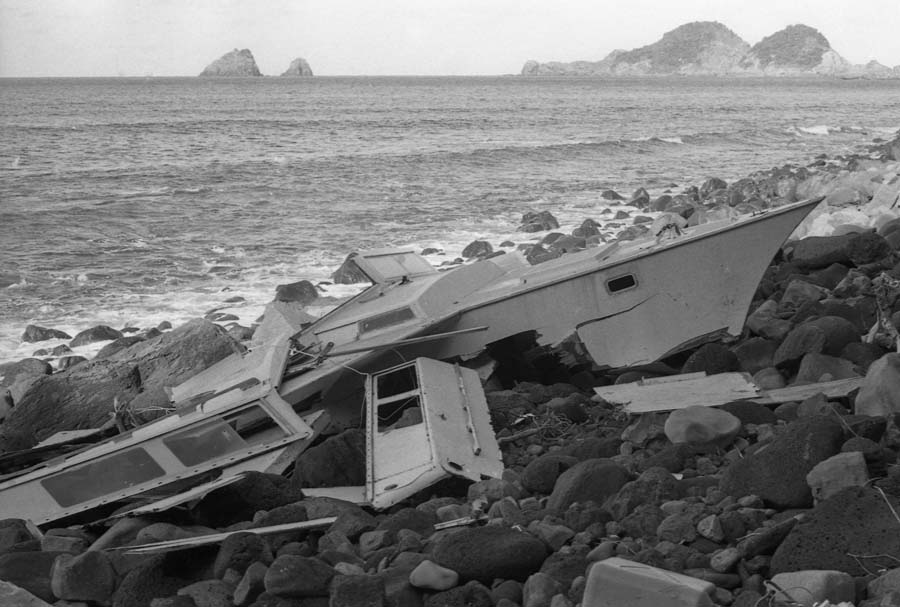 Ariel wrecked west of Fishing Rock. Photo: Lance Andrewes 1975
Ariel wrecked west of Fishing Rock. Photo: Lance Andrewes 1975
Account from 'The Islander' Sept 1975 Vol3 No1
May was a great month for visitors. On the 2nd, the Whangarei yacht Tainui II called in - on the 7th , the Mari from Florida arrived, then the Realm, a 52 footer from Whangarei came on the 24th. And the trimaran Ariel on the 29th, but she unfortunately lies wrecked on the boulder beach about 500 yars west of Fishing Rock. The crew had a rough trip from Great Barrier Island, and it took them 21 days to make it to Raoul. They were very tired and glad to be on dry ground again. Against our advice and a warning of bad weather approaching, they decided to sleep ashore. Our Met Officer on night shift notified them twice of the worsening weather, but no move was made by the crew. When we tried to get them to the yacht in the morning, they couldn't get back in their dingy and it was that bad we couldn't even launch the station boat. The skipper of the Ariel said that he had two anchors out and the yacht would ride it out OK. This it did for about 36 hours, when the wind went from the NE to NW. Then during the next night she dragged anchor and we had the job of looking for her. She was in the small bay west of Fishing Rock with the port pontoon missing and the bottom ripped out of the main hull. A few days were spent by everyone salvaging what we could from the wreck. Very little was lost really in the way of possessions - it was just a case of drying the things out. The boat of course was a write off.
The Toa Moana called in on the 27th June to collect out castaways.........
Evening Post 2nd July 1975
Crew of wrecked trimaran may be billed for trip from Raoul
The possibility that they might be charged for their passage and a months enforced stay on Raoul Island was the first news from home for a wrecked trimaran's crew members when they arrived in Wellington early this morning in the Government ship Toa Moana. The party comprising three New Zealanders - Isabel Marshall of Auckland, Marie O'Shaughnessey of Napier and Nigel Heard of Wellington - and the trimaran's owner, American Harold Gelnew, had only the clothes they were wearing and little personal gear.
They lost practically everything when their vessel went down. Mr Gelnew was particularly despondent. A mariner with several years experience, including single handed sailing, his 35 foot Ariel was uninsured.
The trimaran left Auckland on April 25 and the crew's seamanship was really put to the test when the vessel ran into a storm two days out. "We were worried a bit at first - probably most about the capabilities of the Ariel - but these were unfounded. She was a good sea boat and Mr Gelnaw had years of experience, including single handed sailing behing him, " said Miss Marshall. A period of calm followed the storm and then came another storm. It anchored off Fishing Rock at 9am on May 29.
Eager for the feel of dry land under thei feet, all four crew members rowed ashore about noon after leaving the trimaran securely anchored. But when they tried to return in the evening, they found the weather had worsened again. "A strong rip was the main trouble and we nearly got washed away," Mr Heard said. Attempts to reach the vessel were abandoned and the party spent the night on the island. Another attempt was made next morning, but again failed. The wind increased all day and at 4am on the third day the wind changed to a northerly. Anchors, however, were set for westerly and they did not hold. Slowly the trimaran dragged towards the shore and ended up on the rocks.
With no other means of transport available, the four crew spent a month marooned on the weather station island. They were told at one stage a ship could be diverted to take them off, but they would have to pay the charges. "But we were broke. We spent all our money provisioning the ship," said Mr Heard. "The staff on the island were great," said Miss Marshall. "There was no work for us, we just spent the days swimming and tramping."
Finally they were told that the Toa Moana, from the Cook Islands would be arriving to take them off. She was making an unscheduled call to unload a drum of oil, urgently needed to keep machinery going. They finally left Raoul last Thursday. But before doing so they had to sign an indemnity form said Mr Heard. This said that they would be allowed off (Raoul Island) if they ultimately paid all costs. And the news that they might be charged - even for the passage was not a good homecoming. "We've nothing against the crew of the ship, they were wonderful," said Miss O'Shaughnessy. "They went out of their way. It's the Ministry of Transport we're upset about." At an early stage they were told they might have to stay on board until the money was paid. Commenting on the possibility of paying for their keep and transport, Mr Heard said, "We're really browned off - they said we might not be allowed off until we had paid up - especially when we had to sleep on the floor of the saloon."
A Government official who visited the ship on her arrival however, said that the party would be allowed off the ship. Although there would be no charge for their stay on the island they would, however, be billed for their passage to Wellington. Miss Marshall said that they had never made a passage in a yacht before. But that was how Mr Gelnaw preferred his crew members. He had stressed that personality was more important than experience which would be picked up in due course. He proved correct as within a few days they were adept at handling and navigation. A previous crew had left the Ariel at Auckland and Mr Gelnaw advertised for replacements.
But if things seemed bad for the three New Zealanders they were even blacked for Mr Gelnaw. He was confronted by Government officials including senior customs men. The problem was that he had not prepared a re-entry permit into the country. The US embassy, however, was informed immediately of the position and Mr Gelnaw, clad in jeans, an old jersey and cap and jandalls, was driven to the Terrace headquarters by obliging customs officers to tackle the necessary paperwork. He said that he was too upset to speak about his experience and would not comment at all on the loss of his boat.




